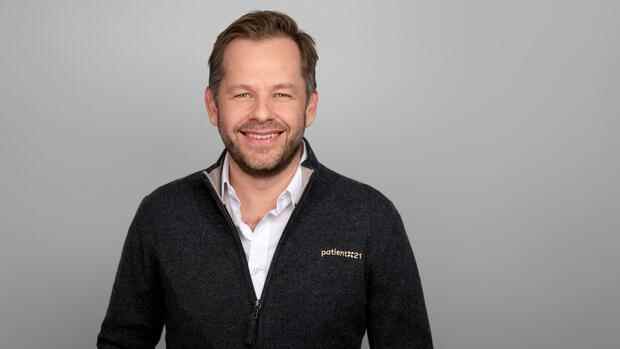“We want to bring the healthcare system into the 21st century,” says Muhr.
Dusseldorf, Frankfurt “Testicular cancer,” says Christopher Muhr. It is the answer to the question of why he founded a healthcare start-up. He is known in the startup and e-commerce industries as the man who drove the expansion of online car retailer Auto1. Until mid-2018. “I fell ill with testicular cancer at the end of 2017 and have had very intensive experiences with the German healthcare system,” he explains.
For someone who was already selling used cars across Europe on the Internet at the time, these experiences were unbearably analogous. MRI appointments were postponed because doctors had not sent his laboratory values. X-ray images should have been transported through Berlin by taxi, says Muhr. Now he’s recovered and wants to make all this smarter.
Patient21 is one of many start-ups that want to digitize the healthcare sector. Everyone has the idea of ultimately saving human lives with better networking and use of data. But rarely is the business model so radical, and the ambitions so great: Muhr not only wants to deliver more intelligent software, he wants to take over entire medical practices right away – and he’s targeting a huge market.
Muhr founded Patient21 in 2019, has already collected more than 125 million US dollars from investors, bought an affiliated hospital in Heidelberg and 25 medical practices for gynecology and dentistry, for example. But so far he has never publicly explained what exactly he intends to do.
Top jobs of the day
Find the best jobs now and
be notified by email.
The vision: a modern form of polyclinic in which specialists at different locations work together in a digital network. Patients can consent to revealing their medical history to all doctors in the network. This should reduce the administrative effort and leave more time for the patients – but above all enable data-based treatment within the company’s own network of doctors.
Many companies are pushing into the attractive market
The market addressed is huge: According to the Federal Statistical Office, more than 85 billion euros in health care expenditures flowed into medical and dental practices in Germany alone. Outpatient facilities generate more than 200 billion euros in sales. In the corona pandemic, these numbers are likely to have increased further.
However, other players in the market are already pursuing the network idea: the private hospital group Asklepios, with sales of more than four billion euros, has been working with Samedi since 2017. With the Samedi software, treatment pathways can be tracked in more than 150 Asklepios hospitals and medical facilities. No more information should be lost between the inpatient and outpatient areas.
Other digital companies want to better connect doctors and patients. These include Docplanner, which recently took over the Burda subsidiary Jameda, and the French Doctolib. The technology company with 1700 employees offers software in several European countries with which patients can book appointments online, practices can manage themselves digitally and doctors can offer video consultations.
>> Read here more about the Jameda deal and the business of the doctor rating platforms
Sievert Weiss is a medical graduate and offers a digital reference work for medical knowledge with his Berlin start-up Amboss. Medical students use his software to learn before the exam, clinicians use it to find out before operations. He is well acquainted with the problems in companies: “Today doctors are busy sending faxes back and forth, which is of course absurd. If there was an interface and the willingness to participate, something would be gained immediately.”
Data protection can become a major brake
But it won’t be easy, Weiss also sees pitfalls: “How will you deal with the patient data? Are doctors and patients getting involved across the board? There are people in Germany in particular who are demanding that everyone should be able to control their health data themselves, for example via a blockchain.” In addition, the advantages would only be generated within the network. And Weiss also sees many competitors in a position to take a similar path to Patient21.
Muhr wants to connect a hundred facilities to his network by the end of next year. The high capital requirement does not worry him. That should also be due to Shmuel Chafets. The Target Global investor has supported Patient21 from the very beginning together with other venture capitalists and knows Muhr from his investment in Auto1. “When Chris decided to go in a new direction, I knew I would fund whatever he did,” he says.
With him, Muhr also has a supporter on board who lives in Israel and knows the possibilities of a digital health system: “If I go to any doctor and he looks at his computer, he sees my entire medical history,” says Chafets. Maybe that will soon be possible with his frequent visits to Berlin.
More: These are the most valuable start-ups in Germany, Europe and the world
